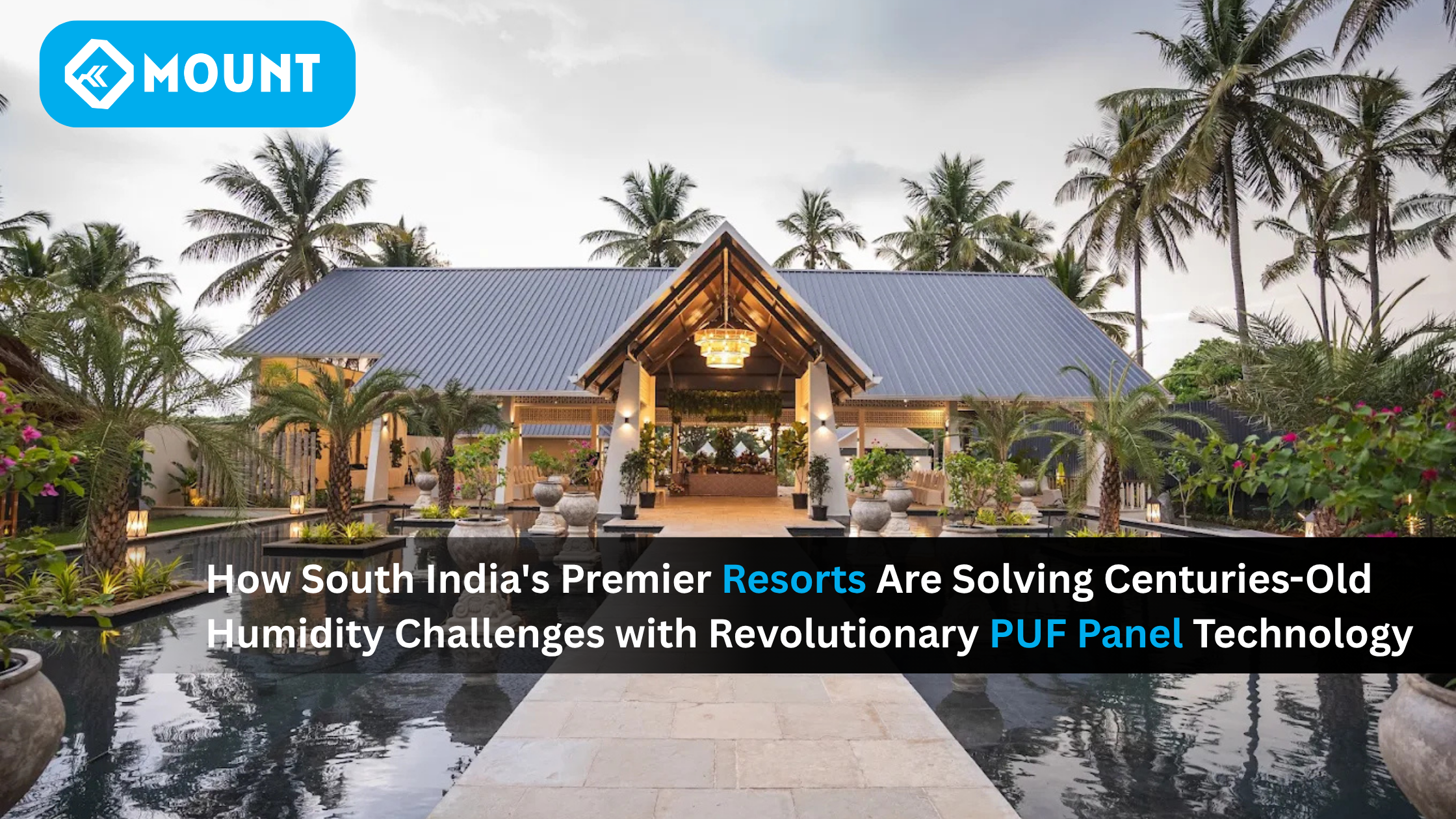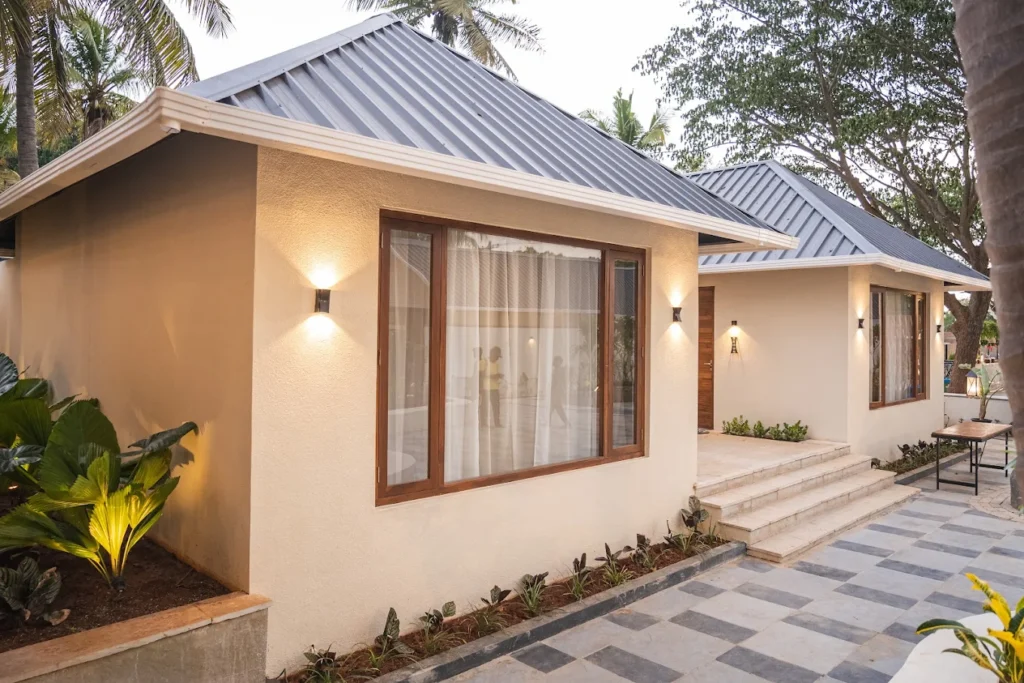
How South India’s Premier Resorts Are Solving Centuries-Old Humidity Challenges with Revolutionary PUF Panel Technology
The monsoon-drenched landscapes of South India have challenged architects for millennia. From the Western Ghats’ misty highlands to Kerala’s backwater regions, the relentless combination of tropical heat, seasonal torrents, and year-round humidity has made comfortable, durable construction an engineering puzzle that has persisted across generations. Traditional materials like thatch, timber, and clay tiles, while locally sourced and culturally significant, often succumbed to decay, pest infiltration, and thermal inefficiency within just a few monsoon cycles.
Today, a revolutionary transformation is sweeping across South India’s hospitality landscape. PUF roofing sheets and sandwich PUF panels manufactured by Mount Roofing are enabling architects and resort developers to create structures that not only withstand the region’s challenging climate but actually leverage it for enhanced guest comfort and operational efficiency. This isn’t merely an incremental improvement—it represents a fundamental paradigm shift in how we approach construction in some of the world’s most demanding humid environments.
Recent market analysis indicates that the global PUF Panel Market Size was valued at USD 11.23 billion in 2024 and is projected to reach from USD 1.61 billion in 2025 to USD 2.85 billion by 2033, growing at a CAGR of 7.4%, with South Asia representing one of the fastest-growing adoption regions. This growth is particularly pronounced in the hospitality sector, where resort developers are discovering that PUF roofing panel manufacturer’s technology enables previously impossible architectural ambitions while dramatically reducing long-term operational costs.
Understanding South India’s Architectural Challenge
South India’s climate presents a perfect storm of architectural challenges that traditional building methods struggle to address comprehensively. The region experiences humidity levels that regularly exceed 80% during monsoon seasons, with coastal areas maintaining 70-85% humidity year-round. Temperature variations between day and night, combined with intense solar radiation followed by torrential rainfall, create thermal stress patterns that cause conventional materials to expand, contract, and ultimately fail.
The Western Ghats region, home to numerous eco-resorts and jungle lodges like Vythiri Resort in Wayanad, Kerala, represents the type of challenging environment where traditional construction methods often prove inadequate within just a few years of construction.
The Science Behind PUF Panel Success
PUF sheet for roof applications address these challenges through advanced cellular chemistry that creates millions of closed-cell structures within each panel. This cellular architecture provides three critical performance characteristics that traditional materials cannot match:
Thermal Resistance: The closed-cell structure creates continuous insulation that prevents thermal bridging, maintaining consistent interior temperatures regardless of external conditions.
Moisture Management: Unlike materials that absorb moisture, PUF panels repel water while preventing condensation formation through superior vapor barrier properties.
Structural Integrity: The sandwich construction provides exceptional strength-to-weight ratios while maintaining flexibility to handle thermal expansion without cracking or separation.
Kerala’s Jungle Resort Revolution
Kerala’s jungle resort industry has become an unexpected laboratory for advanced PUF panel roof applications. The state’s unique combination of dense tropical vegetation, seasonal flooding, and tourist expectations for luxury amenities creates construction requirements that push building materials to their absolute limits.
Recent data shows 13 major jungle resorts in Kerala are incorporating PUF panel technology, with several flagship properties serving as case studies for the broader hospitality industry. The results have been remarkable:
- 40% reduction in HVAC energy consumption compared to traditional construction
- Zero moisture-related maintenance issues in the first three years of operation
- Enhanced guest comfort ratings due to consistent interior climate control
- 75% faster construction timelines due to prefabricated panel installation
The Wayanad district experiences some of India’s most challenging humidity conditions, with morning mist levels reaching 95% and afternoon temperatures soaring above 35°C. Modern jungle resorts utilising Mount Roofing’s sandwich PUF panel systems now create large, open spaces spanning 20-30 meters without intermediate supports, delivering immersive experiences that blur the boundaries between indoor comfort and outdoor adventure.
Karnataka’s Eco-Lodge Transformation
Karnataka’s jungle resort network, operated through Jungle Lodges and Resorts Ltd., encompasses 19 resorts with 366 accommodations ranging from luxury cottages to eco-friendly tents. This diversity of accommodation types has provided an ideal testing ground for various PUF roofing panel manufacturers applications.
The transformation has been particularly pronounced in elevated regions like Coorg and Chikmagalur, where altitude variations create additional thermal stress challenges. Resort operators report that structural PUF panels construction has enabled:
- Year-round operational capability without seasonal closures for monsoon damage repair
- Premium pricing sustainability due to consistent guest comfort regardless of weather conditions
- Environmental compliance through reduced energy consumption and minimal site disturbance during construction
Commercial Applications Beyond Hospitality
While resort applications have garnered significant attention, the commercial applications of structural PUF panels across South India extend far beyond hospitality. Major hotel chains like Hyatt are announcing strategic growth plans with 21 deals signed in 2024 and 7 hotel openings expected for 2025 across prominent destinations such as Kochi, with many of these projects incorporating advanced PUF panel technology from the design phase.
Industrial Manufacturing Excellence
South India’s manufacturing sector, particularly in food processing, pharmaceuticals, and electronics, has revolutionised controlled environments through PUF panel adoption:
- 45% reduction in HVAC loads through thermal stability
- Continuous vapor barriers that eliminate condensation risks
- Chemical resistance that withstands industrial cleaning processes
- Rapid installation that minimises production disruption during construction
Educational and Healthcare Innovations
The unique requirements of educational campuses and healthcare facilities in humid climates have driven innovative applications of sandwich PUF panel technology, enabling:
- Large, column-free spaces for multipurpose use
- Precise climate control for sensitive activities
- Long-term durability with minimal maintenance
- Fast construction to minimise operational disruption
Environmental Impact and Sustainability
The environmental implications of widespread PUF panel roof adoption across South India extend significantly beyond immediate energy savings:
Operational Energy Reductions
- 35-45% reduction in cooling energy consumption during peak summer months
- 20-30% reduction in dehumidification energy during monsoon seasons
- 50-60% reduction in heating energy in highland regions during winter months
- Overall HVAC energy savings of 40% across varied climatic conditions
Material Efficiency and Longevity
The precision manufacturing of sandwich PUF panels eliminates construction waste common with traditional materials:
- 95% reduction in on-site construction waste compared to conventional roofing systems
- 30+ year service life with minimal maintenance requirements
- Recyclable core materials at the end of service life
- Reduced chemical treatments are needed for pest and moisture control
Economic Returns: Proven Investment Value
While a PUF sheet for roof applications may involve higher initial material costs compared to traditional alternatives, the total cost of ownership demonstrates compelling economics:
Immediate Installation Benefits
- 50-70% reduction in installation time compared to conventional roofing systems
- Elimination of multiple trade requirements through an integrated system approach
- Weather-independent installation that avoids monsoon delays
- Reduced crane and equipment rental due to lightweight panel characteristics
Long-term Operational Advantages
- Average annual energy savings of 40% for HVAC systems
- Elimination of periodic roof replacement cycles common with traditional materials
- Enhanced property values through superior performance characteristics
- Reduced insurance premiums due to improved weather resistance
The Mount Roofing Advantage
Mount Roofing’s approach to PUF roofing panel manufacturers’ technology incorporates several innovations specifically designed for South India’s challenging conditions:
Advanced Foam Chemistry: Proprietary formulations that maintain cellular structure integrity across temperature ranges from 10°C to 50°C while resisting humidity-induced degradation.
Precision Manufacturing: Computer-controlled foam injection systems ensure consistent density and cell structure throughout each panel, critical for humid climate applications.
Regional Customisation: Different formulations optimised for coastal salt air resistance, highland temperature variations, and industrial chemical resistance requirements.
Future of Climate-Intelligent Architecture
The success stories emerging from jungle resorts in Kerala’s Western Ghats, eco-lodges in Karnataka’s hill stations, and commercial developments across Tamil Nadu demonstrate that the centuries-old challenge of building successfully in humid climates has finally met its match.
As climate change intensifies weather extremes and urbanisation accelerates across tropical regions globally, the lessons learned from South India’s PUF panel revolution provide a template for climate-responsive architecture that could transform construction practices worldwide. The integration of advanced materials science with a deep understanding of local climatic conditions has created possibilities that extend far beyond solving immediate technical challenges to enable entirely new categories of architectural expression.
Mount Roofing’s innovative structural PUF panels have created solutions that simultaneously address comfort, efficiency, durability, and sustainability requirements that seemed mutually exclusive with traditional materials. For architects, developers, and construction professionals working in challenging climates anywhere in the world, South India’s transformation provides both inspiration and practical guidance for creating buildings that work in harmony with their environment rather than against it.
The revolution in PUF roofing sheets technology is reshaping how we build for the future—one that demands structures capable of thriving in nature’s most challenging conditions while delivering uncompromising comfort and efficiency.





